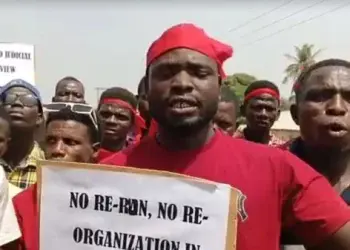Vice-President, Professor Naana Jane Opoku-Agyemang, has announced sweeping new measures aimed at reducing the country’s long-standing dependence on raw cocoa exports, as part of a broader strategy to create jobs, improve farmer livelihoods, and increase Ghana’s share of global cocoa revenues.
Speaking at the European Union Sustainable Cocoa Initiative in Brussels, Prof. Opoku-Agyemang said the government is implementing a targeted plan to increase local cocoa processing before export, describing value addition as the foundation of Ghana’s next phase of economic transformation.
“Our goal is simple but urgent — Ghana must no longer be seen only as a source of raw materials but as a hub for high-quality processed cocoa products that reflect the skill, innovation, and hard work of our people,” she stated.
Expanding processing capacity
Prof. Opoku-Agyemang revealed that government incentives have already led to a sharp rise in national cocoa processing capacity, which now stands at approximately 500,000 tonnes per year.
The initiative, she explained, forms part of a long-term plan to strengthen Ghana’s negotiating position in international trade and to help the country benefit more equitably from the multi-billion-dollar global chocolate industry.
She called for stronger institutional and financial backing for small and medium-scale cocoa processors, particularly in rural communities where most cocoa is produced.
Many of these enterprises, she said, face prohibitive borrowing costs, limited access to finance, and inadequate infrastructure that undermine their competitiveness.
“We must build an ecosystem where small processors are not just participants but leaders in the value chain,” she urged, noting that inclusive growth is essential for sustainable industrialization.
From Tetteh Quarshie to 800,000 farmers
During her remarks at the Global Gateway Forum’s Sustainable Cocoa Scale-Up session, the Vice President reflected on Ghana’s cocoa heritage — from Tetteh Quarshie’s pioneering introduction of cocoa in the late 19th century to the thriving industry of over 800,000 farmers today.
She emphasized that sustainability must go hand in hand with fairness, noting that “the story of Ghanaian cocoa is not just about export earnings, but about dignity, livelihoods, and the rural communities whose work sustains an entire global market.”
AfCFTA and financing challenges
Prof. Opoku-Agyemang highlighted the African Continental Free Trade Area (AfCFTA) as a crucial platform for building regional value chains that keep more wealth within Africa.
However, she warned that financing gaps continue to impede progress.
According to her, much of the available investment flows into large multinational or state-owned facilities, leaving local processors with high lending rates and few opportunities to expand.
To address this imbalance, she proposed structured blended financing models that combine long-term capital investment with affordable working capital, risk-sharing mechanisms, and technical support, especially for rural-based cocoa enterprises.
“We cannot achieve transformation if the heart of our industry — the local processor — is financially excluded,” she said.
“The EU Sustainable Cocoa Initiative and the Global Gateway Framework offer excellent opportunities to forge new and balanced partnerships.”
Responding to price volatility and market inequality
Recent global cocoa price hikes, driven by production shortfalls in West Africa, have drawn renewed attention to the fragility of the cocoa economy.
Prof. Opoku-Agyemang warned that while high prices may offer temporary relief, they expose deep structural weaknesses in supply, disease control, and productivity.
She said Ghana remains open to partnerships that combine research in pest and disease control with commercial-scale plantations, ensuring both quality and predictability in cocoa production.
The Vice-President also criticized the persistent tariff escalation policies in global trade, where duties on processed cocoa products such as butter, liquor, and chocolate are significantly higher than those on raw beans.
This, she said, continues to penalize value addition in Africa and perpetuates a global trade imbalance.
“We are not asking for charity, but for fairness,” she said firmly. “If we process our cocoa, we should not be punished for doing so.”

Reforming COCOBOD and ensuring quality
Prof. Opoku-Agyemang reaffirmed that Ghana’s grading and quality control systems remain among the most rigorous in the world, ensuring the country’s cocoa retains its reputation for excellence.
She pointed out that reforms at the Ghana Cocoa Board (COCOBOD) are underway to improve transparency, ensure fair pricing, and restore investor confidence in the sector.
“Our institutions are evolving to meet the expectations of a modern cocoa economy — one that rewards quality, fairness, and sustainability,” she noted.
Cocoa and Ghana’s economic transformation
Cocoa, she emphasized, is central to Ghana’s broader economic transformation agenda, forming a key pillar of both the Big Push Initiative for agro-industrialization and the Connect24 component of the 24-Hour Economy — a policy designed to enhance the movement of goods, energy, and data for around-the-clock productivity.
Prof. Opoku-Agyemang also reiterated Ghana’s commitment to the Living Income Differential (LID) — a pricing mechanism introduced jointly with Côte d’Ivoire in 2019 to guarantee farmers a fair and stable income.
“The LID was not just a pricing tool; it was a statement of principle — that the people who grow the world’s cocoa deserve to live in dignity,” she said.
A vision for a fairer cocoa future
Concluding her address, the Vice-President said Ghana’s path forward is to move decisively beyond raw exports toward a diversified, technology-driven, and inclusive cocoa economy that uplifts farmers and transforms communities.
“We must build a cocoa sector that not only sweetens the world’s palate but enriches the lives of the men and women who make it possible,” she declared. “Our vision is a Ghana that exports not beans, but value — not just products, but prosperity.”
Cocoa’s enduring role in Ghana’s economy
Cocoa remains the backbone of Ghana’s agricultural export economy, contributing about $2 billion annually and accounting for nearly 20% of export revenues.
However, the majority of the crop is exported in raw form, limiting the country’s earnings compared to the enormous profits made from processed products in Europe and North America.
With the new push for local processing, Ghana hopes to retain a greater share of global cocoa wealth, create thousands of skilled jobs, and position itself as a major player in the premium chocolate and confectionery markets under AfCFTA and other trade frameworks.












